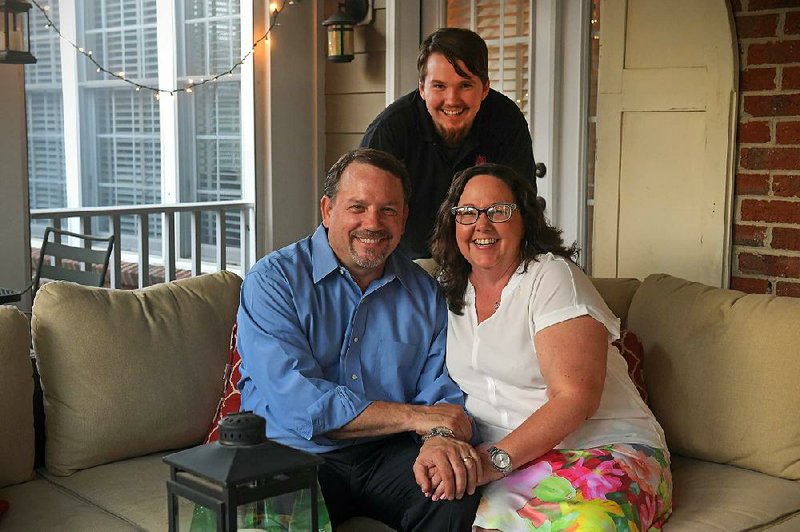By her mid-40s, Diana Rodriguez envisioned a life free of children. She'd had hers early; two sons were grown and married, and her daughter was in college.
"I was kind of looking forward to having an empty nest, because when you have your children so young, you never had a chance to explore life and not have those responsibilities," says Rodriguez, 54.
Instead, her sons' marriages broke up and they moved back in -- one for two years, the other for eight months -- to the Alexandria, Va., house she shares with her husband, who is not their father.
"He didn't say no, but it was a situation where it wasn't the master plan," she says.
Maybe not, but Rodriguez's sons are part of an increasingly dominant cohort of adult children who live with their parents. A study released recently by the Pew Research Center found that 32 percent of 18- to 34-year-olds now do so -- more than in any other living arrangement.
The trend is the reverse of what their parents grew up with. Baby boomers came of age during an all-time low in grown children living at home -- in 1960, just 19 percent did.
"I graduated from college and left," Courtney Taliaferro, 52, says. "I always knew that if I got in trouble that I had a place to go back to, but I never wanted to go back."
But her 25-year-old son has lived with her and her husband in their Leesburg, Va., house for two years, and most of his friends are doing likewise.
For the middle-aged people whose houses have become de facto dorm rooms, post-college apartments and sometimes even marital homes for the next generation, this new normal has good and bad ramifications.
For Rodriguez, having her sons around meant she and her husband suddenly felt awkward in their own home.
"They were not always there, but often we were like, 'Well, do we invite them to eat dinner with us?'" she says. "You feel like you don't want to leave them out because they are another household person."
At the same time, the house felt crowded.
"It's like, 'Oh, you're in the kitchen making something? Well, I was going to make something,'" Rodriguez says. "It's not a big thing, it's the little things -- the cumulative effect of, 'Gee, I really wish I could walk around in my underwear.'"
Some parents, however, welcome the incursion.
"It has never bothered me for one moment that they're here," says Jim Burt, 58, whose 26-year-old son lives at home and whose 28-year-old daughter did until recently. "I love them both dearly, and I love seeing them here. ... If they moved out, I would be sad."
GENERATIONAL SHIFT
His enthusiasm represents a generational shift: Parents now are much more likely to see their children as friends.
Today's parents of young adults "were the young people of the famous generation gap of the '60s and '70s; they were complaining that their parents were so stuffy," says Jeffrey Jensen Arnett, a research professor of psychology at Clark University in Massachusetts. "When they became parents, they set out to be different from their parents, and I think what we're seeing is that they succeeded."
Changes in child-rearing practices have had a big effect, says Stephanie Coontz, research director at the Council on Contemporary Families.
"There's been a trend ... where you really allowed the child to explore their own interests rather than expect them to become a clone of you, and the result is that young people, they like their parents more than our generation did," she says. "There's been an increase in respect for kids, and as a result, an increase in kids seeing their parents as people they can confide in and show weakness to."
In a 2013 poll of parents of 18- to 29-year-olds, Arnett found that 61 percent felt mostly positive about their children living at home while only 6 percent felt mostly negative.
"For some reason, we have this peculiar stereotype that parents can't stand their kids and want to get rid of them as soon as possible and groan when they show up on the doorstep," Arnett says. In fact, he says, "it's not this can't-wait-to-get-rid-of-them kind of attitude."
For one, adult offspring are often easier to be around. "They're not 6 years old, or 13 or 14; they're less likely to be egocentric slobs," he says, adding that the children generally have outside social lives, jobs, school and romantic partners. "They don't need to be driven around; they don't need help with their homework; and they can even help out."
MADE THEM FEEL CLOSER
In fact, 67 percent of respondents said living together made them feel closer to their child emotionally.
Burt's children join him at rock concerts such as Yes, The Rolling Stones and the Moody Blues, and he watches television shows such as The Walking Dead and Game of Thrones with them.
"There was much more of a generation gap between me and my parents than between me and my kids," he says.
That so many others are doing it also helps make it feel more acceptable to parents, Arnett says. "You would have been more surprised 30 or 40 years ago that your child was still in the late 20s and not married or your child was changing jobs frequently in the mid-20s."
Parents also understand that it is more challenging now to find jobs and rent or buy a house.
"This is a hard economy to break into in terms of any kind of security and predictability," Coontz says. "Parents who can afford to give their kids the rope to come back, to say, 'Yes, you can do this for a while. You can use this as a base. You can go back to school. You can bring your baby home if you're a single parent.'"
Good things can result, including stronger intergenerational bonds and less isolation for parents as they get older. But if there is not good communication and understanding, Coontz says, "resentments over time can build."
'I THINK IT WAS A MISTAKE'
Manana Sukhareva, 55, and her husband grew up in the Soviet Union, where "it was impossible to leave your parents because there was no way you could earn enough to rent."
So when her son Nick chose to stay in their Bethesda, Md., house while attending the University of Maryland at College Park, it didn't worry her.
"I thought that it was OK and it was no problem, but looking back I think it was a mistake," she says.
Nick, 28, still lives at home and works at a restaurant, four years after getting a degree in history. "You have to be with your peers. He's not a very social person, and if he were living on campus, he would be kind of pushed into doing something."
His day-to-day presence in the house does not bother her, but she worries about what it means for his ability to have a career and family.
"We do our thing. If we need to go somewhere, we go. If we want to have friends over, we have them," she says. "At some point he stopped coming with us on vacations because he didn't want us to pay for his vacation. He feels like he doesn't deserve a vacation. ... Some people tell me, 'Well, you should kick him out and he will do something.' But as a parent you can't kick him out."
END IN SIGHT
The setup is often easier for parents if the children are working toward independence.
"If I felt like he wanted to be stagnant then I'd be worried about it, but he's constantly thinking about how he's going to get on with the next part of his life," Courtney Taliaferro's husband, Will, 52, says of their son. "It might cramp our style a little bit, but we really just want him to be happy. Our thing is if we can help him get some traction now by supporting him a bit longer, then we should do what we can."
"Sometimes my husband and I might want time with each other and that's a little harder to come by, but for the most part, I like having him here," Courtney Taliaferro says.
Does her son do chores?
"Not enough, no. He does OK, but you have to go behind him and remind him that he rinsed his dish and put it in the sink but there's a dishwasher right there."
He also lets his laundry pile up. But he feeds the dog when they leave town.
For Rodriguez, having her sons back taught the family some lessons in boundaries and empathy.
"If it's at all possible, you have to set up a timeline -- how long are you going to live here, realizing what the expectations are, realizing it's not going to be ideal for anyone involved," she says. "I think that it actually strengthened our relationship, because, to this day, they are so grateful to us for helping them. As they've gotten older they've realized, 'Man that must have been a drag for you.'"
Family on 06/15/2016


